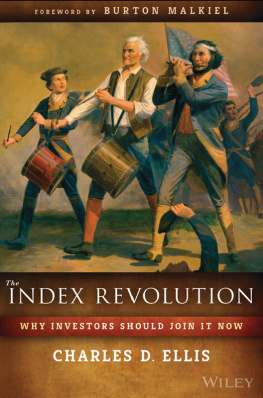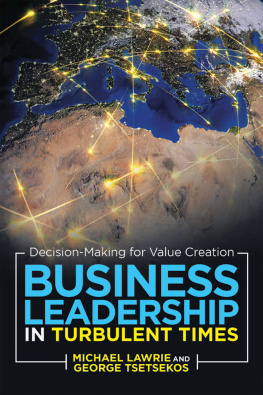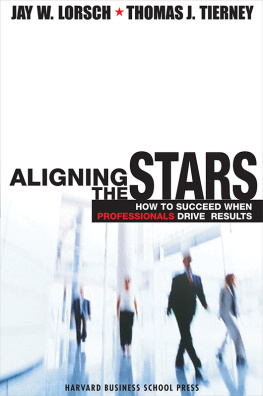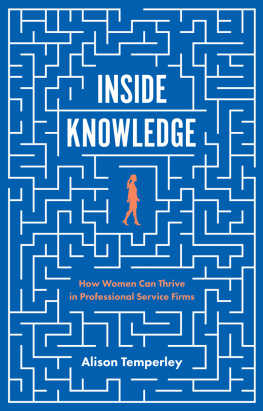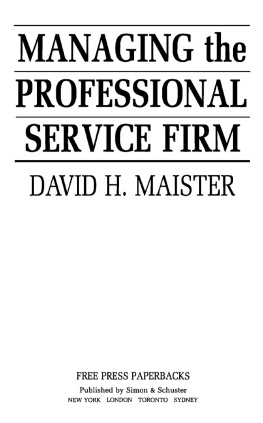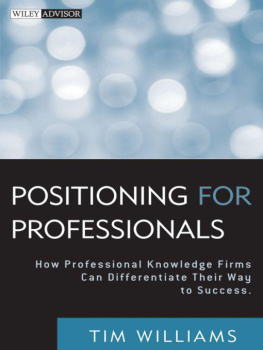About the Author
CHARLES D. ELLIS serves as a consultant on investing to large institutional investors, government organizations, and wealthy families, and as managing partner of a pro bono partnership of nearly 100 Harvard Business School classmates and friends, The Partners of 63, which commits time and treasure in support of entrepreneurial, change-oriented ventures in education, particularly those focused on children born into tough circumstances.
Charleys professional career centered on three decades with Greenwich Associates, the international strategy consulting firm he founded in 1972. Recognized worldwide for the proprietary research which informs its consulting, the firm grew in the 30 years he was managing partner to serve the leading firms in over 130 professional financial markets around the world.
Services to the investment profession include: Chair and two terms as governor of the professions CFA Institute and an associate editor of both the Journal of Portfolio Management and the Financial Analysts Journal . He is one of 11 people honored for lifetime contributions to the investment profession.
Academic activities include two appointments (in 1970 and 1974) to the faculty of the Harvard Business School and one (in 1986) to the Yale School of Management, both to teach the advanced course on investment management, and 20 years on the faculty of the Investment Workshop at Princeton.
Charley chairs the Whitehead Institute for Biomedical Research, where he also chairs the investment committee, and is a trustee of the Robert Wood Johnson Foundation, where he chairs the finance committee. He has previously served as a successor trustee of Yale University, where he chaired the investment committee, as trustee of Phillips Exeter Academy and Eagle Hill School, as an Overseer of the Stern School of Business at New York University, as a member of the Visiting Committee and the Board of Directors of the Associates of the Harvard Business School, and as a director of the Vanguard group of mutual funds and several business ventures.
The author of 16 books, including The Partnership: The Making of Goldman Sachs (Penguin), Winning the Losers Game (McGraw-Hill) , and Joe Wilson and the Creation of Xerox, Capital , and, with Burton Malkiel, The Elements of Investing (all John Wiley & Sons), Charley has written over 100 articles for business and professional journals. His article The Losers Game won the investment professions Graham & Dodd award in 1977. Joe Wilson was selected as one of the best business books of 2006.
A graduate of Exeter and Yale College, Charley earned an MBA (with distinction) at Harvard Business School and a Ph.D. at New York University. He is married to Linda Koch Lorimer, vice president of Yale University. Their four children are Harold, Chad, Kelly and Peter.
Afterword
The pleasure of exploring the great firms and learning their seven secrets of success must, of course, be balanced by the sadness of knowing how few aspiring firms will truly excel. Still, all can strive to be their best. Having devoted a long career to consulting with and studying professional firms, Ive learned firsthand how terribly difficult it is for a human organization to go beyond very good and achieve and sustain excellence. Most organizations in law, medicine, finance, investment, auditing, and consultingand most leadership teams at corporations, universities, schools, museums, hospitals, and the militarymay never achieve excellence, and most of those that do will not long sustain excellence. Still, we can all enjoy observing the true exemplars just as we can all learn from them how we can be better.
Ive also learned to respect and admire those remarkable organizations of all kinds thatlike Olympians who won medals, but not quite the goldmade themselves finalists. Had we more time together, they, too, would warrant study, because they, too, have lessons for all of us who lead organizations large and small businesses, governments, universities, churches, and military organizations.
In consulting, Booz Allen, Bain, BCG, and AT Kearney have, at different times, been leaders, but none has surpassed or long rivaled McKinsey.
Of 200 or more major investment management organizations, Capital excels, but other strong firms include BlackRock, Dodge & Cox, Pimco, Primecap, T. Rowe Price, Vanguard, and Wellington.
Among 1,000 large law firms, several are excellent. Davis Polk, Debevoise Plimpton, Skadden Arps, OMelveny & Myers, Sullivan & Cromwell, and Wachtell Lipton are remarkable. Still, most lawyers agree that Cravath is clearly outstanding.
Among several hundred health-care organizations, Johns Hopkins, Mass General, Kaiser Permanente, Intermountain, and Cleveland Clinic are outstanding, but Mayo Clinic is supreme at achieving its chosen mission: The needs of the patient come first.
Of nearly 100 securities firms that have risen to prominence at one time or another over the past century, only Goldman Sachs is currently recognized as the best of its kindeven as it now faces great challenges, particularly from within. It is also challenged competitively by the formidable JPMorgan Chase.
Of course, many smaller, newer firms aspire to become leaders. But we know from history that only a very few will excel. There is no way to predict which specific newcomers will have the unrelenting combination of inspiring mission, disciplined culture, extensive and rigorous recruiting, intensive and continuous training, persistent innovation, and the servant leadership to bring increasing strengths in these many disciplines together and correct the inevitable troubles to ensure continuing excellence.
Meanwhile, we can celebrate the great firms and encourage all contenders because those that excel provide their clients with superb service, provide their professions with high standards, and provide individual professionals with profoundly meaningful careers.
We all know the advertising tagline Wheaties, the breakfast of champions. But do all champions eat Wheaties? Are all those who eat Wheaties champions? No and No. There is no direct causal connection between eating Wheaties at breakfast and becoming a champion. Similarly, proving causation in professional fieldsexactly why a few firms rise to and sustain professional excellenceis impossible. However, the characteristics of the truly great professional firms are stunning in their consistent repetition. Every great firm is clearly strong on every one of the vital strengthseach in its own wayand superb on several. Thats why they excel.
Individual and organizational excellence is always deliberate. Champion athletes share a compelling determination to do their very best in every competition. For a certain few of the most talented and driven people, being part of a great firm is so important, fulfilling, and rewarding that they could not accept less any more than a great musician could always be flat or a great dancer out of step. They want to excel more than they can explain or others can understand. They need to excel. Thats who they are. For the superbly capable professional, something special comes with being part of the very best: the satisfaction of knowing you belong there as a member of a championship team and that you are meeting the high internal standards that keep you striving to exceland the quiet confidence that nobody does it better.


